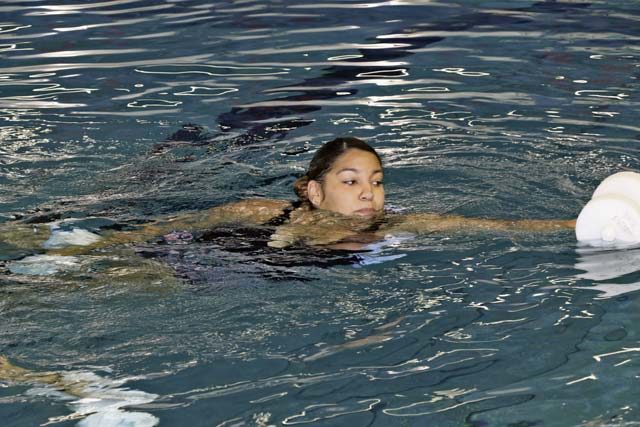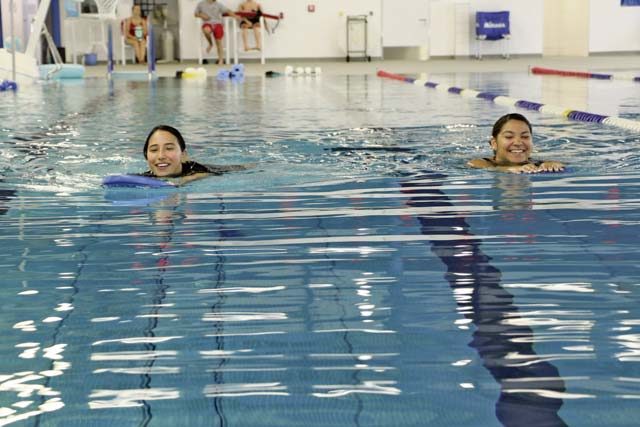Story and photos by Alofagia Oney
Landstuhl Regional Medical Center

The U.S. Army Health Clinic Baumholder is taking Soldier readiness to new depths, offering aquatics physical therapy to patients for pain management and rehabilitation. Sgt. Belinda Flowers, the noncommissioned officer in charge of the Baumholder Physical Therapy Clinic, dives in with her patients every week to ensure not only high quality healthcare delivery, but to also get Soldiers back in the fight and help family members to feel their best.
“[Aquatics physical therapy] is a great tool for recovery because you’re not bearing your full body weight when you’re in the water,” said Flowers. “Patients can do a lot more in the pool than they can do on land.”
According to Capt. Daniel Huffman, a physical therapist at Landstuhl Regional Medical Center and a board certified clinical specialist in orthopedic physical therapy, a person will only bear about 10 percent of his body weight if standing still in neck-deep water, and about 50 percent if in at waist-deep water. Adding underwater movement and activity will only slightly raise those percentages, but overall, aquatics therapy is still a great option to “un-weight” injured patients and help them rehabilitate quicker.
“Aquatics therapy is mostly beneficial for patients who have a hard time doing exercises on land,” said Flowers. “For example, if exercises like squatting and lunging result in pain for you, aquatics therapy is a great option because you’re not putting your full body weight on your lower joints.”
For patients like Alicia McDowell, a counselor at the Baumholder Soldier for Life Transition Assistance Program who underwent reconstructive surgery to her anterior cruciate ligament, or ACL, the new aquatics therapy program was a welcomed option.

“When I originally had my surgery in Texas [in 2005], I did aquatics therapy and it had a lot of benefits,” said McDowell. “So, I figured this time around it would be just as great if not better.”
The ACL is a major ligament in the knee that connects the thighbone (femur) to the shinbone (tibia). Damage to the ACL can result in excruciating pain in the leg, and oftentimes requires consistent rehabilitation to restore the range of motion.
“I think [aquatics therapy] is definitely worth it because instead of putting that stress on your body trying to balance, the water takes away a lot of that weight for you and makes things easier,” said McDowell. “My husband actually got foot surgery recently, so after my first session with Sgt. Flowers, I told him that he needs to come and try it.”
McDowell’s husband, Army Staff Sgt. Isaac McDowell assigned to the 515th Transportation Company located in Baumholder, is one person that Flowers is eager to treat.
“When Soldiers have injuries resulting in severe pain that keep them from their warfighter duties, oftentimes they are put on a [medical] profile limiting their physical training,” said Flowers. “With aquatics therapy, Soldiers can still work on their cardiovascular endurance but without the impact. Unit commanders can appreciate that because their Soldiers aren’t falling behind.”
Flowers also pointed out that following a surgical procedure, doctors tend to prescribe physical therapy to get patients moving.
“As we say in physical therapy,
‘motion is lotion,’” said Flowers. “Working your injured areas to move early after surgery is optimal and we want to set our patients up for success.”
For McDowell, working with Flowers is helping her improve the range of motion in her knee, but also provides pain management for injuries in her neck and back.
“Sgt. Flowers is amazing,” said McDowell. “She knows just what to do to get me back into shape.”
TRICARE beneficiaries referred to the Baumholder Physical Therapy Clinic will be assessed by the provider to determine if aquatic therapy is an appropriate treatment course.







